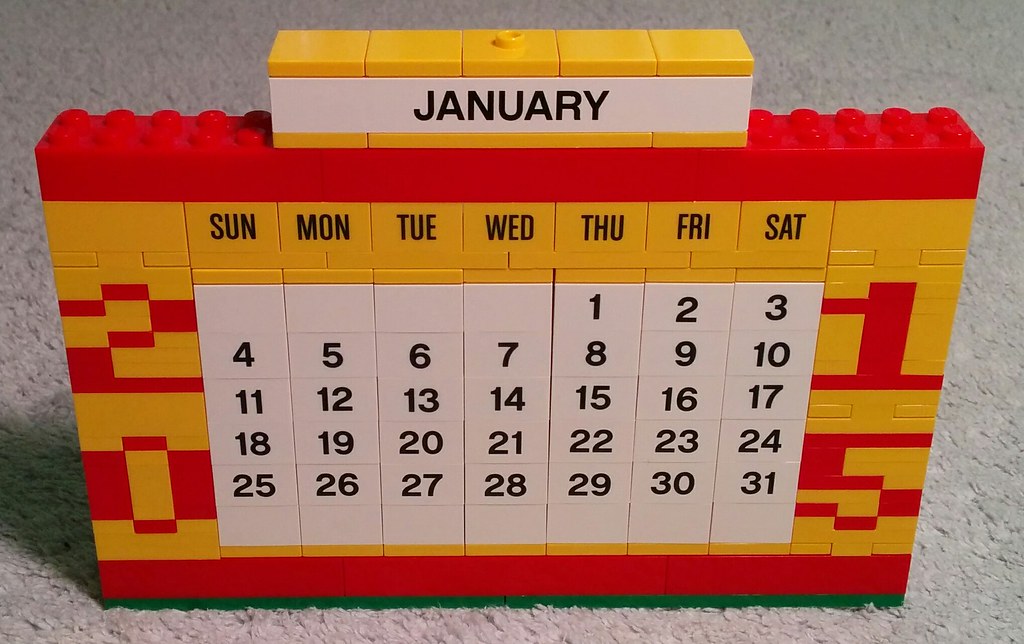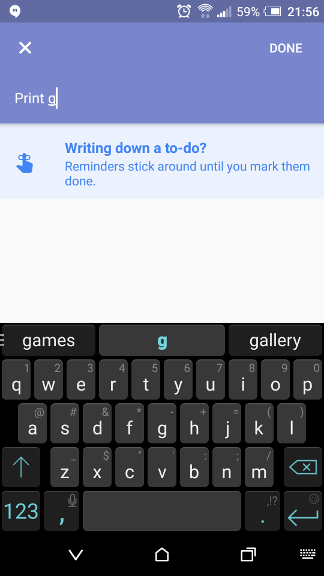
Improved LEGO Calendar Front by Bill Ward
Often, there’s simply not enough time to do all the stuff we want to do. If you keep a list of your tasks, checking off and adding items over time, then you will probably have seen your list grow longer and longer, unless you are very realistic about the kinds of tasks you plan to do.
As the list grows longer, it becomes less useful. The many items distract you from what is actually important, and checking off items feels like emptying the ocean with a spoon. After some time you are more likely to start a new list than to keep using the old one. And this is okay if it helps you get things done that you care about. But it won’t be long before the new list is also long and “icky”.
I think it’s normal to wish to get more stuff done than what you have time for, but the cycle of starting and discarding to-do lists is not very productive. It’s mainly useful at the start of each cycle when the list is short. I found that a practical way to keep my to-do list short (apart from having more hours in a day) is to put it in my calendar.
By using a calendar, I mean that each task you write down should have a specific date, time, and duration, and live among your “normal” appointments and events. This helps you move from the abstract to-do list world where you have all the time you need, to the real world where you have to be at least a bit realistic about when you can start a task, and how much time you can allot to it.
Considering the time something takes also forces you to be more specific about what you are actually planning to do — which is the part you should write down in the calendar! A concrete task description is much more likely to spur you into action later. Vague, abstract goals are a major cause of procrastination — whether you use a calendar or not.
Interruptions and a base level of unscheduled activities are likely both at work and at home, so I leave time for these when I set the event duration. I especially use the system at home where I also want to relax after work in the evenings and weekends, so there my time estimation is very loose. I might fill a small ten minute task into a one- or two-hour slot. My goal is not to do focused work in all of the calendar event’s duration. Instead, the goal is to fill my calendar with no more tasks than I will realistically do in a day or evening. Each day thus contains a short to-do list.
If you overestimate your own capacity to perform tasks stuffing too much into a single day, there will be undone tasks. This is another critical point where a calendar separates itself from a regular old to-do list. An undone item in a to-do list stays there, as a future activity. An undone item in a calendar lies in the past where you will probably forget about it. This is a feature, not a bug!
If you did not have time to perform a task, you can reschedule it to a less burdened day. If the task is important to you, you are also likely to remember to reschedule it immediately.

Google Calendar trying to be helpful.
But often, “not having time” simply means not caring enough, and in that case, it’s also likely that you will even forget to reschedule the task, which is good because it prevents that unimportant task from clogging up your future to-do lists/days.
While tasks may be unimportant from their inception, others become obsolete because an alternate solution to the problem was found or because of changing priorities. Sometimes you will reschedule a task multiple times before realizing that it is not important enough to keep. Or perhaps you will finally do the task after seven reschedulings, because you eventually had more time or willpower. The system adapts to your capacity over time.
The way that a regular to-do list keeps all undone tasks is the cause of long, icky lists. Requiring a manual action to keep an undone task highlights the absurdity of indefinite postponement. (Indefinitely rescheduling a few tasks is certainly possible, but as you try to do it with more and more tasks, the extra work of rescheduling should remind you that this is not a sustainable solution.)
Any calendar should do the trick; I use Google Calendar. But sometimes when I add a new event that sounds like a to-do, it suggests converting it to one instead of creating an event. This is a disservice. I do want the passage of time to clean up the stuff I’m never going to get done anyway.
In the previous section I say that importance influences what you get done and what you should reschedule. What is important is of course up to you. But why do we even have unimportant tasks? I don’t think it should be seen as an either-or. Instead, it depends on how much time and energy we have available.
In my case, I have many ideas for small home improvements and hobby projects that the dreaming part of me wants to do but the actual me doesn’t feel like doing. It’s not that I strictly don’t have time, it’s just that I would rather be doing something else. So they are not actually important. Buying someone a birthday present or doing my taxes would be important.
Some tasks are given to you by other people, perhaps especially at work. Does that mean that they are important? Some of them of course, but not necessarily all of them. Just like the tasks you set for yourself, tasks given by someone else can also fall in the nice-to-have category. Or they are “important” to your boss, but there are fifty things that are even more important. Other times, the important thing is the goal, and reaching the goal through steps X-Y-Z can make steps A-B-C obsolete. (Remember, a to-do list should contain doable tasks, not goals.)
A classic distinction in time management and productivity is between urgent and important tasks. By using the calendar I do not mean you should focus on time and urgency over importance. The only goal is to keep your daily to-do list short enough as to boost motivation rather than drain it. As with a regular to-do list, it’s up to you to figure out what is important in your life.
Posted by Erik Ramsgaard Wognsen productivity ]{.categories}
« Yousician “No tempo definitions found”
© 2018 - Erik Ramsgaard Wognsen - [Powered by Octopress]